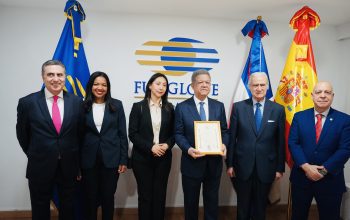news
GFDD and FUNGLODE Confirms its Sixth Global Roundtable with the Ambassador of Antigua and Barbuda to the United Nations
July 12, 2011
On Friday, July 15, Global Foundation for Democracy and Development (GFDD) and its sister institution in the Dominican Republic, FUNGLODE will present it’s Sixth Global Roundtable in partnership with South-South News, a digital media platform committed to promoting dialogue on issues of international concern. The ongoing program is also a part of GFDD’s goal to support the work of the United Nations and as a non-governmental
organization with consultative status, contribute to the visibility and understanding of its work.
The Global Roundtable will host H.E. John W. Ashe, Permanent Representative of Antigua and Barbuda to the United Nation and Co-Chair on one of the world’s most high level environmental conferences, Rio + 20.
Nearly twenty years ago, the world came together in Rio and recognized the urgency of changing our destructive patterns of
consumption and production. Now Rio + 20 is soon approaching, it will be an important opportunity to revisit the challenges of the last twenty years and to re-direct this debate in productive ways.
The Ambassador will discuss the issues on the table at the upcoming conference, as well as the impacts that climate change is having on his own small island nation. Other topics will include Tourism and Information Communications Technology (ICTs).
About Antigua and Barbuda
The Siboney were the first to inhabit the islands of Antigua and Barbuda in 2400 B.C., but Arawak Indians populated the islands when COLUMBUS landed on his second voyage in 1493. Early settlements by the Spanish and French were succeeded by the English who formed a colony in 1667. Slavery, established to run the sugar plantations on Antigua, was abolished in 1834. The islands became an independent state within
the British Commonwealth of Nations in 1981.
Antigua and Barbuda is one of the Caribbean’s most prosperous nations, thanks to its tourism industry (which accounts for nearly 60% of GDP and 40% of investment) and offshore financial services. The country’s strength lies in its tropical climate and good beaches, which have made it popular as a stop-off point for US cruise ships and have attracted large investments in infrastructure
Antigua is the main population centre and the focus for business and tourism. Relatively-undeveloped Barbuda is home to smaller, exclusive resorts and a sanctuary for frigate birds.
But a reliance on tourism makes the nation vulnerable to downturns in the world market. Internet gambling sites based in the country are an alternative source of revenue. However, Antigua and the US have been locked in a trade dispute over American restrictions on online
gaming.
For decades Antigua and Barbuda’s politics was dominated by the Bird family, with Vere Bird being the country’s prime minister from independence in 1981 until 1994, when he was succeeded by his son, Lester, who spent a decade in office.
Baldwin Spencer and the opposition United Progressive Party won a landslide victory in general elections in March 2004.
The win ended the political
dynasty of the Bird family, which had dominated Antiguan politics for more than half a century.
Mr. Spencer promised to fight corruption and added that "crimes committed against the people" would not go unpunished. He led the United Progressive Party to victory again at the March 2009 general election, albeit with a reduced majority.
After taking office in 2004, the Spencer government adopted an ambitious fiscal reform
program, and was successful in reducing its public debt-to-GDP ratio from 120% to about 90% in 2008.. The Antiguan economy experienced solid growth from 2003 to 2007, reaching over 12% in 2006 driven by a construction boom in hotels and housing associated with the Cricket World Cup, but growth dropped off in 2008 with the end of the boom. In 2009, Antigua’s economy was severely hit by the global economic crisis, suffering from the collapse of its largest financial institution and
a steep decline in tourism. This decline continued in 2010 as the country struggled with a budget deficit.
Antigua and Barbuda is a member of the United Nations, the Bolivarian Alliance for the Americas, the Commonwealth of Nations, the Caribbean Community, the Organization of Eastern Caribbean States, the Organization of American States, the World Trade Organization and the Eastern Caribbean’s Regional Security System.






